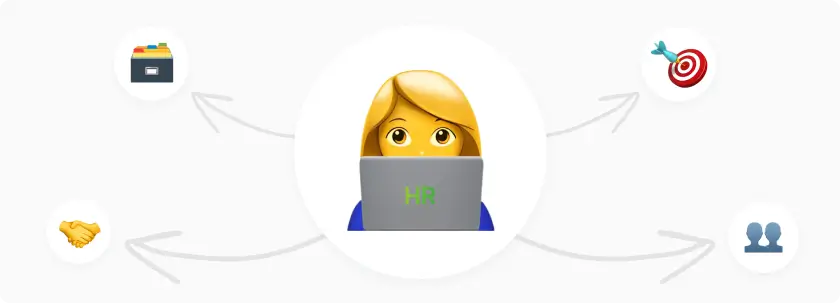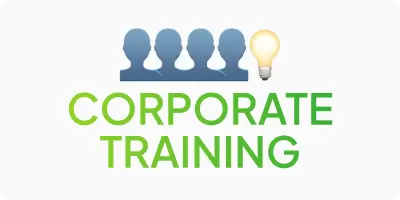
An HR manager (Human Resources Manager) is a person who is responsible for managing personnel. The HR manager has many tasks and functions, all of which are aimed at ensuring the company’s efficient operation and comfortable working conditions.
What are the main responsibilities of an HR manager?
Recruitment and selection of personnel:
- Developing and publishing vacancies: The HR manager drafts job postings and posts them on various platforms to attract the right candidates the company is looking for.
- Interviewing: They conduct initial interviews with candidates, assess their qualifications and suitability for the position.
- Collaboration with department heads: The HR manager works closely with department heads on a regular basis to identify their staffing needs and discuss candidate profiles.
- Onboarding: a candidate’s first day, week, month in the company has an impact on their future productivity and motivation, so the HR manager is responsible for integrating a new employee into the team and improving their future performance.
Managing employee performance and development:
- Performance Appraisal: They develop and implement performance appraisal systems to identify employee strengths and weaknesses (sometimes done in conjunction with department heads to better understand the specifics of the job).
- Training and development: HR managers organize training programs and refresher courses for employees to promote their professional development.
Compensation and benefits management:
- Developing a compensation system: HR managers develop the structure of salaries, bonuses, and other financial rewards.
- Benefits management: They are responsible for health insurance programs, retirement plans, gym reimbursement, and other benefits provided by the company.
Ensuring compliance with the law:
- Compliance with labor laws: The HR manager ensures that all actions in the company comply with applicable labor laws.
- Developing policies and procedures: They create and implement internal policies that regulate working relationships and ensure that employees’ rights and responsibilities are respected.
Maintaining corporate culture
- Development of corporate culture: An HR manager contributes to the formation and maintenance of a positive corporate culture that promotes employee engagement. When all employees have the same goal, they work more productively and efficiently.
- Conflict resolution: they help resolve internal conflicts and problems between employees, ensuring harmony in the team.
Based on this information, it becomes clear who an HR manager is and what they do, but what skills are needed to become a professional HR manager?
What skills does an HR manager need?

It is very difficult to control people, so the work of an HR manager covers many different areas. In order to perform their duties effectively, they must have the following skills:
Communication skills
- Verbal and written communication: the ability to clearly express your thoughts both orally and in writing. This helps in creating vacancies, communicating with future employees, resolving conflicts, etc.
- Active listening: the ability to listen attentively to the interlocutor, understand their needs and respond to them (if a department is short one employee, the HR manager should clarify this information and find a suitable specialist as soon as possible).
Interpersonal skills
- Empathy: the ability to understand the feelings and needs of other people (employees), which helps to resolve conflicts and maintain a good working atmosphere. An HR manager should identify employee problems as soon as possible and help solve them to prevent staff burnout.
- Persuasion: the ability to motivate employees and convince them of the importance of certain decisions.
Organizational skills
- Time management: the ability to effectively plan your time and the time of other employees.
- Event organization: ability to organize trainings, corporate events and other activities.
Analytical skills
- Data analysis: the ability to analyze productivity, employee satisfaction, process efficiency, and make informed decisions based on the information received.
- Problem solving: the ability to quickly and effectively solve problems that arise in the work environment. This has a significant impact on the company’s atmosphere and subsequent performance.
Knowledge of labor law
- Legal knowledge: An HR manager is the law and justice within the company. Understanding labor laws and regulations helps to regulate work and do everything legally and correctly.
Technical skills
- Knowledge of HR software: ability to use human resource management systems (HRMS), applicant tracking systems (ATS) and other tools that help optimize workflows.
- IT basics: general knowledge of computer systems and databases. This is especially relevant for HR in IT companies, as it is important when analyzing employee performance.
Management skills
- Leadership: in order to manage a team, motivate employees, and make strategic decisions, an HR manager must be a true leader and be respected by all employees.
- Strategic thinking: the ability to see the big picture and plan long-term goals for the development of staff and the company. An HR manager builds a company’s development strategy in the same way as a marketing department, but within the company.
Flexibility and adaptability
- Adaptation to change: the ability to quickly adapt to changes in the company or the labor market. HR managers are constantly faced with changes and challenges, and they must be able to quickly and professionally deal with such situations.
- Flexibility in decision-making: the ability to find compromises and make non-standard decisions in difficult situations. Sometimes, in order to emerge from a difficult situation as a winner, it is necessary to make non-standard decisions, and a true HR manager must have this skill.
Unconventional and little-known facts about HR
- Games for candidate selection: Some companies use gamification in the hiring process. These are special games and simulations that help to assess the skills and behavior of candidates in real-life situations.
- Welfare programs: More and more companies are implementing mental health programs, including meditation and yoga sessions, to help employees reduce stress, increase productivity, and prevent employee burnout.
- The atmosphere in the office: For example, using natural elements such as plants, natural light, and water features to improve employee well-being. It may seem small, but it can significantly reduce stress and increase productivity.
- Creative methods of motivation: Some companies go beyond the standard cash bonuses and provide unusual rewards, such as extra days off, the opportunity to work in another country for a certain amount of time, or even paid volunteer trips.
- Happiness bureau: not many people know about such a position as “Chief Happiness Officer”. Some companies create positions such as Chief Happiness Officer, who is responsible for maintaining a positive work environment and increasing employee satisfaction. This is a very interesting and productive practice, as it helps to increase employee motivation and improve performance.
- Psychometric tests: To better understand candidates and their potential, many companies use psychometric tests that assess personality traits, cognitive abilities, and other psychological aspects.
- Virtual trainings: Some companies use virtual reality (VR) technologies to conduct training, simulate work situations, and prepare for emergencies. This can be an effective way to learn in a safe environment.
Conclusion
An HR manager is the most important person among the staff. His or her task is to recruit and retain staff, create comfortable working conditions, motivate employees, prevent burnout, and improve efficiency.
In order to perform their duties professionally, HR must be communicative, able to listen, know the laws, be able to solve problems, and have many other skills aimed at the correct and efficient operation of the enterprise.












